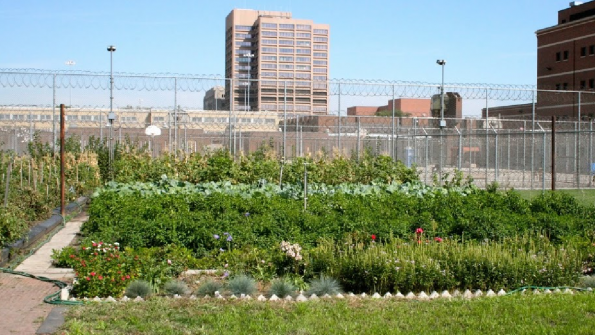Prison produce
Urban gardening is a trend not limited to Brooklyn rooftops and Seattle green spaces. For years, several of the country’s jails and prisons have been cultivating produce to reduce costs, reach out to the community and teach useful skills to inmates.
CNN’s Eatocracy compiled a list of correctional facilities that offer some sort of gardening program. They include:
Cook County Jail – Chicago: For over two decades, the Cook County Sheriff’s Pre-Release Center has worked with inmates on a vegetable garden that generates more than 9,000 pounds of produce a year. The fruits and veggies are donated to local homeless shelters, nonprofits and restaurants. Chicago chef Matthias Merges hires graduates from the program and teaches them to grow restaurant-quality produce, according to CNN.
Richard J. Donovan Correctional Facility – San Diego: The Farm and Rehabilitation Meals program is still in its roll out phase, but if everything goes according to plan, 20 prisoners will be selected to operate a three-acre farm. Produce raised will be used in the cafeteria, and inmates will be taught skills important to life on the outside. ““We wanted to create more opportunities for inmates to have a more meaningful experience while they’re here,” Wehtahnah Tucker, the program’s coordinator and a California Correctional Health Care Services executive, told Time magazine, “so when they leave, they cannot come back.”
Rikers Island – New York City: Launched in 1996 in partnership with the horticultural society of New York, GreenHouse provides remedial education, skill development and vocational training in horticulture. Hands-on experience for inmates includes designing, installing and maintaining multi-use gardens, and designing and constructing of garden fixtures, according to program materials. Once inmates graduate from the program and is released, they have the opportunity to join GreenTeam, GreenHouse’s vocational internship program.
San Quentin State Prison – San Quentin, Calif.: Planting Justice is a program dedicated to promoting sustainable local food systems in urban environments. Last year, the group planted a vegetable garden inside the prison. Like similar programs, the aim is to reduce recidivism by teaching post-prison job skills and to providing access to healthy food for inmates, according to CNN. The group says the recidivism rate among group participants is 10 percent, and the group has hired 10 former inmates to work on landscaping projects throughout the city.
To learn more about Planting Justice and the concept of “food justice,” watch the video below.
_____________
To get connected and stay up-to-date with similar content from American City & County:
Like us on Facebook
Follow us on Twitter
Watch us on Youtube




















